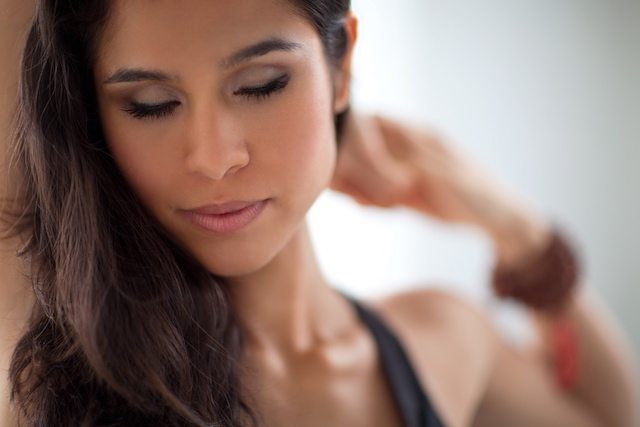If you’ve been following my blog, you probably know by now that I’m a big proponent of probiotics because they promise an impressive array of health and beauty benefits, from preventing bloating to achieving glowing skin. But are you aware of the connection between hair health and probiotics? That’s right, the gut-health connection applies to your mane as well!
It’s exciting if you’ve been suffering from having less than the greatest hair that you want, and have tried everything from taking biotin to using special shampoos, and haven’t yet seen a significant or sustained improvement. This article could change your life!
According to the American Hair Loss Association, by the age of 35, two-thirds of men will experience some degree of hair loss [1, 2]. By the age of 50, that figure jumps to a whopping 85% of men experiencing significantly thinning hair. Now if you’re thinking, poor dudes, but I’m a girl, hold on! Because another figure is that women make up 40% of hair loss sufferers (!). Us women are not in fact immune.
While it’s common, without a doubt, when your hair thins it can be a major blow to one’s confidence. Luckily, losing your beloved locks isn’t necessarily inevitable. So, Beauties, you may be wondering: “Can probiotics stop my hair loss?” Let’s just say you’ll want to keep reading for the full scoop.
Over the past 10 years, there has been a growing body of research that proves this link between probiotics and hair loss prevention. And lucky for you, I’ve rounded up the top reasons how these helpful little bacteria can make a difference on your scalp.
1. Fighting inflammation
One 2010 study published in Experimental Dermatology concluded that certain probiotics can actually promote hair growth by reducing stress-induced skin inflammation. The fact is that hair follicles that are subjected to inflammation cannot support growth [3].
However, probiotics have the ability to counteract this effect, empowering your body to reduce inflammation, and thus enabling hair follicles to sustain growth activity. This is because probiotic bacteria stimulate the anti-inflammatory component of the immune system to release cytokines and hormones that disrupt the damaging pro-inflammatory cycle [4].
One study on thyroid health found that when mice were fed beneficial bacteria they demonstrated a significant increase in anti-inflammatory T-cells [5].
2. Strengthening your immune system
Speaking of T-cells, they help to regulate the functionality of your immune system by aiding in its ability to decide what bacteria, fungi and viruses to fight off in order to keep your body healthy. If you don’t have enough of these cells or they aren’t working efficiently, you’re at a higher risk of developing an autoimmune disease. With these diseases, your immune system recognizes your own cells as foreign pathogens and attacks them.
This then leads to issues like hypothyroidism or alopecia areata (patchy hair loss). With alopecia areata, for example, the immune system specifically attacks the hair follicles. Luckily, according to 2012 research conducted at The University of Texas Southwestern Medical Center at Dallas, probiotics can trigger a positive immune reaction, enhancing the system’s performance [6].
3. Stimulating the growth phase
In terms of hair growth, the anagen stage is essentially when all of the action happens. And a study conducted at the Massachusetts Institute of Technology found that when mice were fed probiotics, they experienced a dramatic increase in active hair follicles as well as overall hair on their bodies [7].
Ever notice how during your youth, your hair seems to grow like rapid fire? Well, MIT researchers concluded that the probiotic bacteria induced changes “mimicking peak health and reproductive fitness characteristic of much younger animals.” As a result, mice consuming the probiotics had far more hairs in the anagen phase when compared with mice on the control diet that were not consuming them.
4. Reducing stress
There’s no doubt that stress and anxiety, whether a result of surgery, illness, childbirth, medications or just lifestyle factors, can promote hair loss. Essentially, when you experience a traumatic event, it can cause a shock to the hair cycle, shoving it out of the growth phase and into the shedding phase more quickly [8].
Your hair will, of course, start to grow again when your body recovers from this stress, but that can take three to six months. The good news? Certain strains of probiotic bacteria can reduce stress and anxiety levels, according to research conducted at the University of Missouri that was published in Scientific Reports [9].
Probiotics can actually reduce the presence of cortisol, which is known as the “stress hormone,” in your body, — in fact, in one study, students who consumed a probiotic-rich beverage while studying for a big exam showed had lower levels of the hormone [10].
5. Facilitating optimal digestion
Your hair is primarily made up of protein. So it’s crucial that your body can effectively digest and break down the protein you consume. Unfortunately, the average American consumes three to five times more protein than they actually need.
And what happens to all that excess? As opposed to being used to form the building blocks of your hair, it becomes a toxic byproduct, wreaking havoc in your gut. Not only do probiotics aid in protein digestion, but they also break down toxins that are produced during metabolism as well as produce antimicrobial substances [11].
In traditional Chinese medicine, unhealthy looking hair and nails are viewed as a top sign of poor digestion. It makes sense because they can hint at your body’s inability to effectively digest and absorb nutrients. Having inadequate levels of stomach acid (a condition known as hypochlorhydria) can lead to nutrient malabsorption.
Proteins aren’t broken down completely into amino acids, which disrupts the absorption of vitamin B12, calcium, folate and a number of other vitamins and minerals. This is problematic as folic acid and biotin play a major role in the growth and appearance of your hair.
Fortunately, probiotics can ensure that your stomach acids stay at optimal levels, which is critical because of they dip too low, bacteria and yeast can make their way into to the intestines and cause a whole slew of issues.
I always recommend soil-based probiotics for digestive health purposes, because they’re particularly effective at reducing unfriendly bacteria and working against other pathogens while empowering your body to be better at breaking down food and reaping the most nutrients from it.
6. Balancing your hormones
Notice your ponytail looking a little skimpy these days? Those who don’t have enough beneficial probiotic bacteria lining their intestinal walls (including leaky gut syndrome sufferers) are more prone to hormonal problems, and hair loss/thinning is a very common symptom of those hormonal imbalances.
That’s because your body relies on a well-functioning thyroid gland for hair growth and other metabolic functions. Hormone levels can be affected by a number of elements, but in women, they tend to decline with menopause. These natural processes, in turn, slow down hair growth [12].
However hormonal imbalances due to thyroid disorders or traumatic events also cause estrogen and progesterone (hormones that promote hair growth) to drop, while increasing androgen (a hormone that causes hair loss). As a result, hair is rapidly sent into the telogen phase, impeding any new growth and resulting in shedding across the scalp.
Sorry to be the bearer of bad news, men — you’re not immune to this. An imbalance of testosterone is also linked to hair loss. And your levels of this hormone begin to gradually decline after age 30. Studies show, though, that consuming probiotics can boost testosterone production [13].
Moreover, probiotics supplementation can increase vitamin D levels by a staggering 25.5% — and vitamin D is crucial to healthy hormone profiles in both men and women [14].
Looking for a Good Probiotic Supplement? Try Soil-Based Probiotics
So, there you have it, Beauties. If you’re eager to maintain a healthy mane, probiotics can make a huge difference by affecting the growth process in a plethora of positive ways.
Just be sure you’re opting for a soil-based probiotic supplement like my Feel Good SBO Probiotics+. Unlike traditional probiotics that are dairy-based, soil-based probiotics are made with soil-based organisms (SBOs). That means that all these good bacteria come straight from the earth, and are 100 percent vegan. Soil probiotics are also hardier and more likely to survive while passing through the digestive tract than traditional probiotics are. Probiotics can’t support your body if they can’t survive in your gut, so you want to make sure they can survive the journey!
Since they can survive in your stomach acid and digestive tract, SBO probiotics can be more effective in supporting your immune system, boosting your gut health, and help your body better absorb the nutrients in your food.
So in short, probiotics can support a healthy gut, better immunity, and more beautiful hair! What’s not to love? :)
In love and health,
Kimberly
[2] Men’s Hair Loss
[3] Is there a ‘gut–brain–skin axis’?
[4] Probiotic ‘glow of health’: it’s more than skin deep
[5] Beneficial Bacteria Stimulate Youthful Thyroid Gland Activity
[6] Interactions between the microbiota and the immune system.
[7] Probiotic Bacteria Induce a ‘Glow of Health’
[8] Can stress cause hair loss?
[9] Common probiotics can reduce stress levels, lessen anxiety
[10] Fermented Milk Containing Lactobacillus casei Strain Shirota Preserves the Diversity of the Gut Microbiota and Relieves Abdominal Dysfunction in Healthy Medical Students Exposed to Academic Stress.
[11] The Science of Probiotics
[12] Causes of Hair Loss
[13] Probiotic Microbes Sustain Youthful Serum Testosterone Levels and Testicular Size in Aging Mice
[14] Oral supplementation with probiotic L. reuteri NCIMB 30242 increases mean circulating 25-hydroxyvitamin D: a post hoc analysis of a randomized controlled trial.






I don’t get pimples or red spots on my face when I consume probiotics.
Thanks for sharing your personal experience Missy and keep up the great work! ;)
Are all probiotics the same.
Hi Beauty! In short, not all probiotics are the same! I think you’ll find this article very interesting – I explain the difference between different types of probiotics, and why I think SBO probiotics are superior for overall health and wellness: https://mysolluna.com/soil-based-organisms-vs-regular-probiotics-which-probiotic-should-you-choose-1/. Check it out and let me know what you think. Happy reading! xx
The article about hair loss is very helpful and relevant to me. Now I can’t wait to try your probiotics! My hair hasn’t been the same since chemotherapy for cancer treatments in 2006! Your site gives me hope that perhaps my hair which has never been the same, can improve! Thank you from the bottom of my heart for the article. I will be the first to let you know if I see results! Sincerely,
Thanks so much Vickie. First and foremost, be patient and you will see results, especially when you’re taking care of your overall health and wellbeing with plant-based foods and the right supplements. I love hearing the progress from my Beauties and look forward to hearing yours in the near future. Lots of love! ;)
This was very informative. Thank you! What other options such as which foods and supplements can promote good hair health?
Hi Sophia – thanks for checking out this post. I have other blogs (on my website) with further information on how to promote hair health but you can start here, with my 5 Tips on Growing Healthy Hair blog: https://bit.ly/2tiSWDh. Happy researching and lots of love! ;)
Hey, Firstly, thanks for sharing your knowledge with us. I’ve read so many article about hair loss. So many people write about their problems and try to talk about solution for those problem. But none of them like your post. It’s clear to read and unique. I hope it’s helpful for everyone like me. I will be happy to read this books as soon as possible. Again thanks for sharing this post.
So happy you enjoyed this blog post Drawyne and that it was helpful. Sending lots of love and continued support! ;)
Thanks for sharing information with us. This article is informative.
I really appreciate your great knowledge. Thanks for the amazing post. Keep doing the great work!